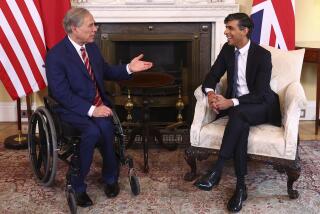Trading on terror to profit a few
- Share via
EVEN AS Congress has finally begun a serious debate about whether U.S. troops should be withdrawn from Iraq, another part of President Bush’s “war on terror” is advancing with far less public fanfare. Last month, the Senate Finance Committee approved the implementation of the U.S.-Oman Free Trade Agreement and cleared the way for its consideration by Congress.
The agreement is part of the president’s dual strategy for fighting the war on terror: direct military engagement and free trade. Then-U.S. Trade Representative Robert Zoellick first announced the policy on Sept. 20, 2001, saying that the administration would be “countering terror with trade.”
Bush reiterated the pledge four years later when he told the United Nations that “by expanding trade, we spread hope and opportunity to the corners of the world, and we strike a blow against the terrorists. Our agenda for freer trade is part of our agenda for a freer world.”
In the years that followed, the war in Iraq -- and the administration’s stated reasons for launching it -- have been widely challenged, but the president’s free trade agenda has received far less scrutiny.
Just two months after invading Iraq, Bush announced his plan for a U.S.-Middle East Free Trade Area, which he said would include 20 countries from western Africa to the Persian Gulf. To make it happen, he established a unique negotiating platform involving a series of bilateral negotiations between the U.S. and each of the individual countries.
If all goes according to plan, the individual free trade agreements will be united under the U.S.-Middle East Free Trade Area by 2013. Negotiations have progressed rapidly as nations throughout the region seek to prove they’re with the United States, not against it.
Oman’s accord would be the fifth free trade agreement between the U.S. and a Middle Eastern country, and the fourth implemented by Bush.
Oman is a relatively small country (just slightly smaller than Kansas) at the southeast end of the Arabian Peninsula between the United Arab Emirates and Yemen. An absolute monarchy, Oman has been governed by Sultan Qaboos bin Said al-Said since 1970. Although its reserves are modest, oil accounts for 75% of the nation’s export earnings and the vast majority of all U.S. imports from Oman (which, in total, were just $422 million in 2004). Apparel is the only other major import product. U.S. oil, energy and apparel companies, in turn, are likely to be the only major U.S. beneficiaries of the agreement.
It should not be surprising, therefore, that the U.S. corporate lobbying group pushing for the MEFTA (the aptly named U.S.-Middle East Free Trade Coalition) includes among its 120 members Chevron, Exxon Mobil, Bechtel and Halliburton -- companies intimately connected to the Bush administration that have been big winners in the war on terror. Their “winnings,” however, have not translated into greater oil security for the U.S., lower prices at the pump for U.S. consumers or lower rates of terrorism.
The Oman free trade agreement provides these companies with expansive new rights and greatly increased access to Oman’s economy, a template they hope will spread from agreement to agreement across the Middle East.
For instance, Oman will give U.S. firms substantially greater access to its service sector, likely including energy, which is largely nationalized. The Omani government also is restricted under the agreement from giving preference to local over foreign companies in virtually all circumstances, including in its energy sector.
On Jan. 19, then-U.S. Trade Representative Robert Portman sent a letter to Oman’s minister of commerce and industry. He affirmed that, when it signs contracts, the Omani government may not give preference to Omantel (the nation’s second-largest employer after the government), Petroleum Development Oman or Oman Liquefied Natural Gas -- that is, to the primary Omani exploration and production companies largely owned by the government of Oman.
Thus, U.S. firms will receive significantly greater access to Oman’s oil profits without any clear benefits for Oman’s economy.
As for Oman’s apparel industry, the U.S. International Trade Commission estimates that the U.S.-Oman agreement will lead to a 66% increase in U.S. imports of apparel manufactured in Oman.
What are the likely effects? A report in May by the National Labor Committee, a not-for-profit research organization, exposed the costs of the first Middle East trade agreement signed by Bush in December 2001 -- the U.S.-Jordan Free Trade Agreement. After that agreement was implemented, new factories arrived in Jordan to service American companies primarily from the apparel industry, including Wal-Mart, JC Penney, Target and Jones New York.
The factories have engaged in the worst kinds of human rights and worker abuses, including 48-hour shifts without sleep, violent physical and psychological abuse and workers brought from foreign countries with their passports held by employers, often receiving no pay for their work. Wal-Mart also is a member of the U.S.-Middle East Free Trade Coalition.
American companies seeking cheap, easy labor are not likely to meet much opposition from the Omani government. The State Department has reported Oman for human trafficking and forced labor abuses. Eighty-five percent of the private-sector workforce in Oman is made up of foreign “guest workers” who are granted limited rights. And the U.S.-Oman Free Trade Agreement does not even include the meager labor standards of the Jordan agreement.
At a moment when people across the Middle East reveal in poll after poll a deep distrust of the United States, and particularly of its actions in the region, it seems ill-advised to advance trade agreements that provide clear rewards to a handful of U.S. corporations but few discernible benefits to either the people of the Middle East or the people of the United States.
More to Read
Sign up for Essential California
The most important California stories and recommendations in your inbox every morning.
You may occasionally receive promotional content from the Los Angeles Times.










